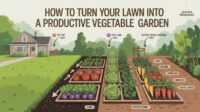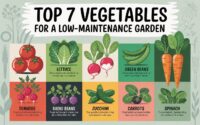The Health Benefits of Eating Homegrown Vegetables
Published: 2025-10-19
Introduction: Why Homegrown Vegetables Matter
In today’s fast-paced world, health and nutrition are top priorities. Because food choices directly impact well-being, many Americans are turning to homegrown vegetables. This shift is not just about saving money. It’s about gaining control over what goes into the body.
Moreover, growing vegetables at home ensures freshness and purity. Unlike store-bought produce, homegrown vegetables are harvested at peak ripeness. They contain more nutrients and fewer chemicals. As a result, families enjoy better taste and improved health.
Whether you have a backyard garden or a few containers on a balcony, growing your own food is empowering. It connects you to nature and supports a healthier lifestyle.
Nutritional Value of Homegrown Vegetables
Homegrown vegetables are packed with nutrients. Because they are harvested fresh, they retain more vitamins and minerals. Vitamin C, potassium and antioxidants are found in higher levels compared to store-bought produce.
Additionally, homegrown vegetables are free from preservatives. They are not waxed or treated for shelf life. This purity supports digestion and immune function. |
Leafy greens like spinach and kale offer iron and folate. Tomatoes provide lycopene, which supports heart health. Carrots are rich in beta-carotene, promoting vision and skin health.
By growing vegetables at home, nutrient density is maximized. This supports energy, focus and long-term wellness.
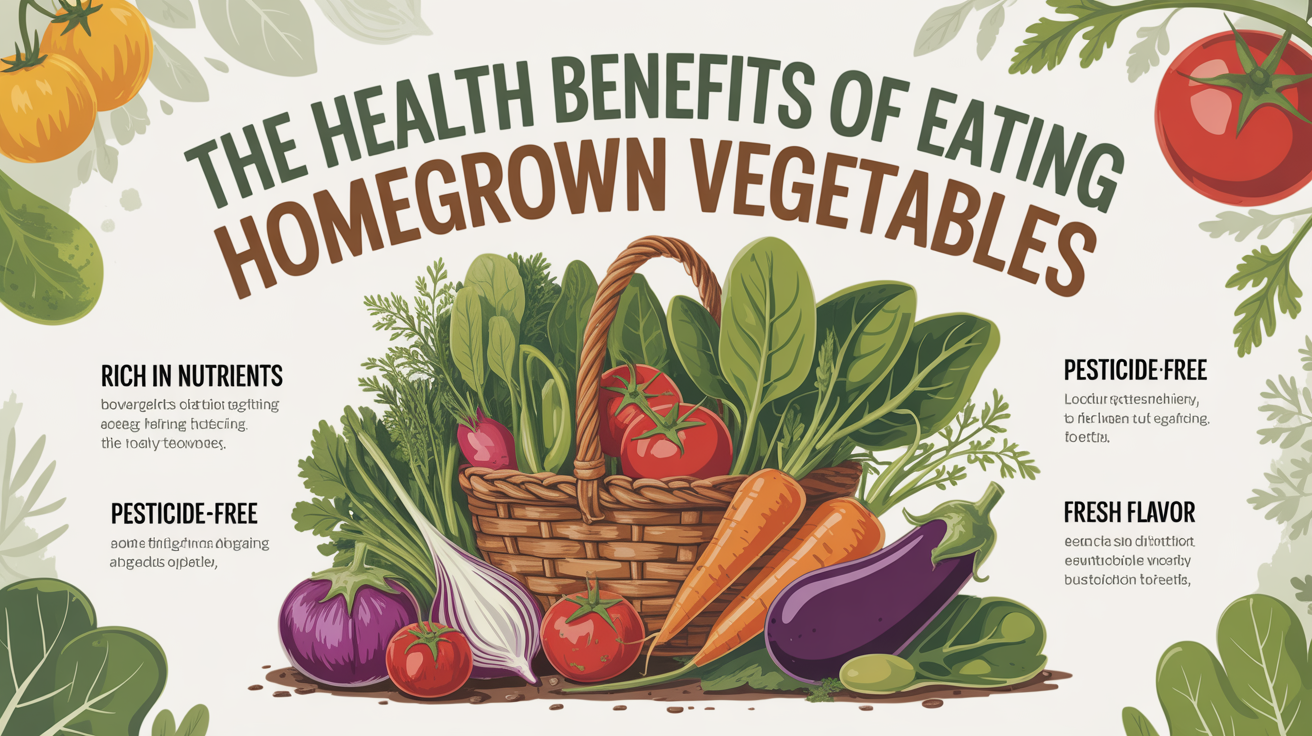
Organic Gardening and Chemical-Free Eating
One major advantage of homegrown vegetables is the ability to avoid pesticides. Commercial farms often use chemicals to control pests and enhance growth. These residues may remain on produce and affect health.
In contrast, organic gardening uses natural methods. Compost, neem oil and companion planting replace synthetic fertilizers and sprays. Soil health is improved and biodiversity is supported.
Because chemical exposure is reduced, risks of allergies and chronic conditions may decrease. Children and sensitive individuals benefit most from clean food.
Moreover, organic gardening aligns with eco-friendly values. It protects pollinators and reduces water pollution. Eating homegrown vegetables becomes a holistic wellness practice.
Gardening itself is therapeutic. It reduces stress and promotes mindfulness. When vegetables are grown and harvested, a sense of accomplishment is felt. This boosts mood and self-esteem.
Eating fresh vegetables also supports mental clarity. Nutrients like magnesium and B vitamins regulate mood and brain function. Omega-3 rich greens like purslane enhance cognitive health.
Moreover, gardening creates routine and purpose. It encourages outdoor activity and reduces screen time. Families bond over planting and cooking together.
By combining gardening with healthy eating, emotional resilience is built. This supports overall mental wellness.
Physical Health Improvements from Homegrown Diets
Homegrown vegetables contribute to physical health in multiple ways. They are low in calories and high in fiber. This supports weight management and digestive health.
Fiber-rich vegetables like beans and broccoli regulate blood sugar and cholesterol. Leafy greens support bone density and reduce inflammation.
Because homegrown vegetables are fresher, they contain more enzymes. These aid digestion and nutrient absorption. Energy levels are improved and fatigue is reduced.
Moreover, gardening itself is physical exercise. Digging, planting and harvesting promote strength and flexibility. Together, gardening and eating fresh vegetables enhance physical vitality.
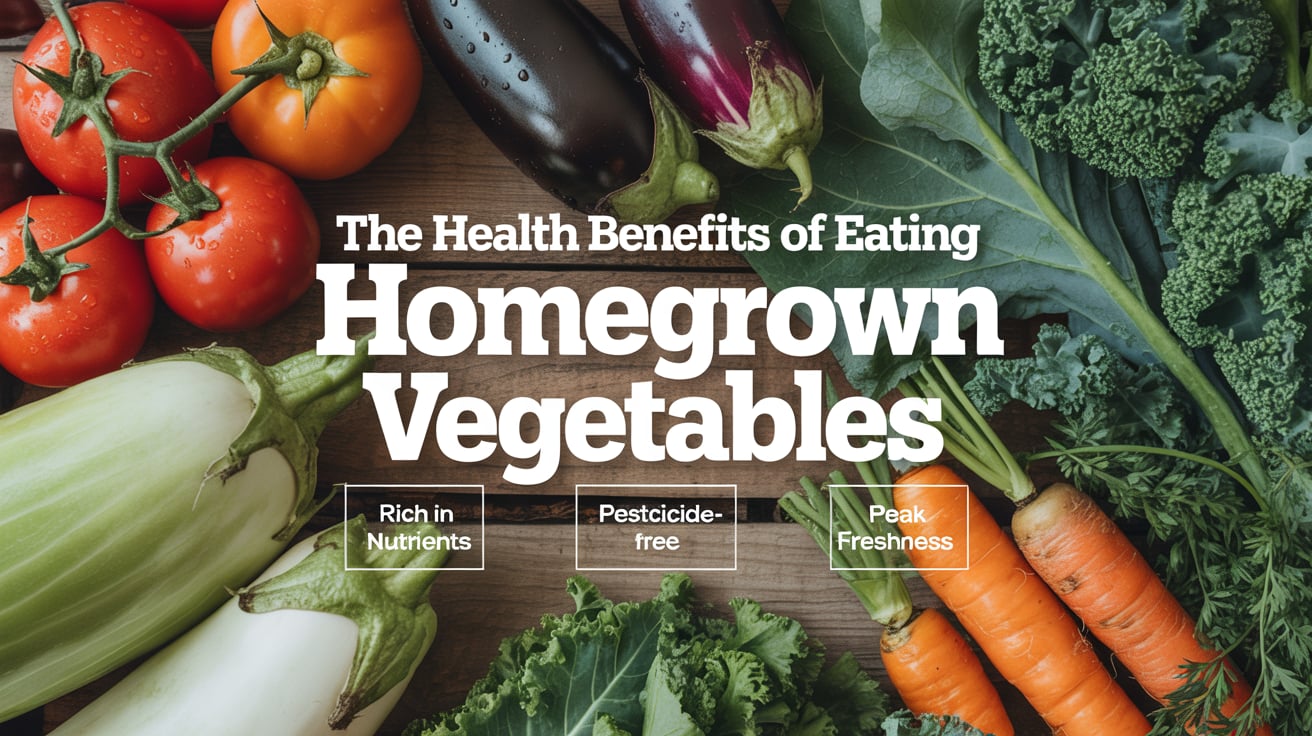
Economic and Accessibility Benefits
Growing vegetables at home saves money. Seeds and compost cost less than weekly produce purchases. Over time, the savings add up.
- Additionally, homegrown food increases accessibility. Families in food deserts gain access to fresh produce. This reduces reliance on processed and packaged foods.
- Container gardening and vertical gardening make use of small spaces. Even balconies and windowsills can support herbs and greens.
- By growing food at home, independence is gained. Nutrition becomes affordable and reliable.
Environmental Impact of Homegrown Vegetables
Homegrown vegetables support environmental wellness. They reduce carbon emissions from transportation and packaging. Plastic waste is minimized and energy use is lowered.
|
Taste and Culinary Benefits
Homegrown vegetables taste better. Because they are harvested fresh, flavors are more vibrant. Sweetness, crunch and aroma are enhanced.
- Cooking becomes more enjoyable. Recipes are inspired by seasonal harvests. Herbs and greens add depth and freshness to meals.
- Children are more likely to eat vegetables they helped grow. This reduces picky eating and builds healthy habits.
- Moreover, experimenting with heirloom varieties adds diversity. Purple carrots, striped tomatoes and lemon cucumbers offer unique flavors and nutrients.
By growing your own food, culinary creativity is unlocked.
Disease Prevention and Long-Term Health
Eating homegrown vegetables may reduce disease risk. Antioxidants and phytonutrients protect cells from damage. This lowers the risk of cancer, heart disease and diabetes.
- Cruciferous vegetables like cabbage and kale contain sulforaphane. This compound supports detoxification and immune defense.
- Leafy greens reduce inflammation and support gut health. Tomatoes and peppers provide vitamin C and flavonoids.
- Moreover, consistent access to fresh vegetables encourages daily consumption. This builds long-term habits and supports aging gracefully.
- By growing and eating clean food, health is protected for years to come.
Cognitive and Developmental Benefits for Children
- Children benefit greatly from homegrown vegetables. Nutrients like iron, zinc and folate support brain development. Omega-3 rich greens enhance focus and memory.
- Gardening teaches responsibility and science. Kids learn about plant life cycles and nutrition. They become more curious and engaged.
- Moreover, eating fresh vegetables improves mood and behavior. Blood sugar is stabilized and energy is balanced.
- By involving children in gardening and cooking, lifelong habits are formed. This supports academic success and emotional well-being.
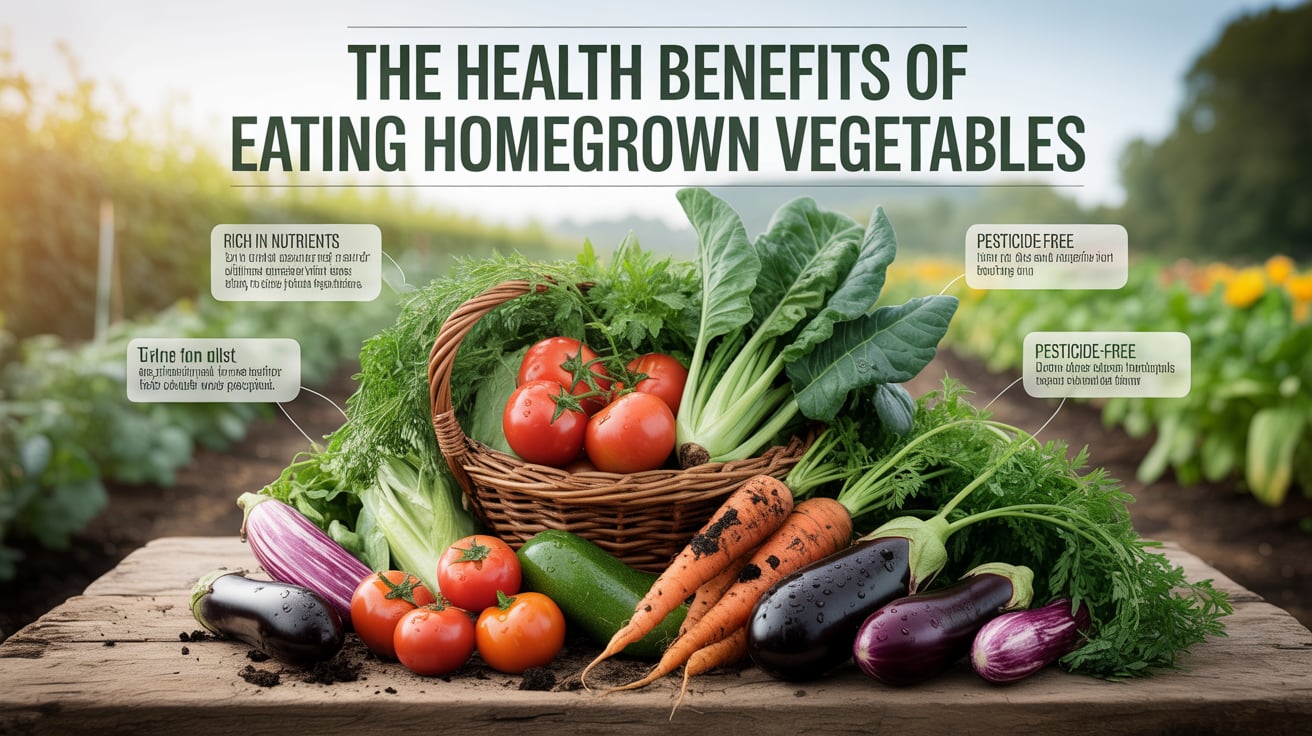
Safe Food Practices and Hygiene
Homegrown vegetables offer control over hygiene. Washing and handling are done at home. Risks of contamination from transport and storage are reduced.
- Soil and water sources are known. Organic practices ensure safety. Tools and containers are sanitized regularly.
- Moreover, harvesting is done at the right time. Overripe or damaged produce is avoided. This reduces spoilage and foodborne illness.
- By growing food at home, safety and quality are ensured.
Cooking and Meal Planning with Homegrown Produce
Meal planning becomes easier with homegrown vegetables. Seasonal harvests guide recipes and reduce decision fatigue.
- Batch cooking and freezing extend shelf life. Soups, stir-fries and salads become staples.
- Moreover, cooking with fresh produce reduces reliance on processed foods. Sodium and sugar intake are lowered.
- Family meals become more nutritious and satisfying. Children learn to appreciate flavors and textures.
- By integrating homegrown vegetables into daily meals, health and enjoyment are increased.
FAQs
Yes they are fresher and contain more nutrients with fewer chemicals.
Absolutely gardening reduces stress and eating fresh supports brain function.
Lettuce tomatoes beans and herbs are beginner-friendly and productive.
It provides exercise and fresh vegetables support digestion and energy.
Yes it avoids pesticides and supports clean eating and soil health.
Definitely they gain nutrients and learn responsibility and science.
Yes seeds and compost cost less than buying produce regularly.
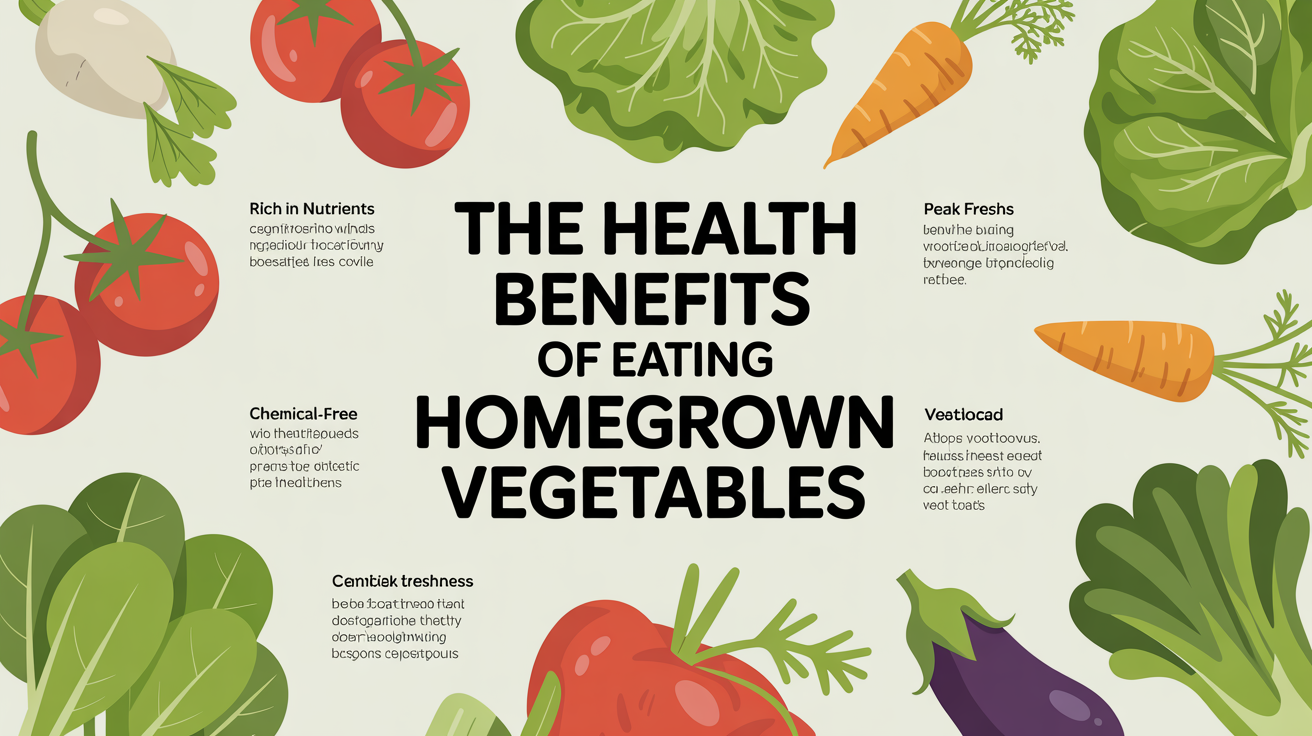
Conclusion: Grow Health from the Ground Up
Eating homegrown vegetables is a powerful wellness choice. It supports physical vitality, mental clarity and emotional balance. From seed to plate, every step builds health and connection.
By growing your own food, you gain control over nutrition and safety. You reduce environmental impact and increase culinary joy. Families bond and children thrive.

- Be Respectful
- Stay Relevant
- Stay Positive
- True Feedback
- Encourage Discussion
- Avoid Spamming
- No Fake News
- Don't Copy-Paste
- No Personal Attacks



- Be Respectful
- Stay Relevant
- Stay Positive
- True Feedback
- Encourage Discussion
- Avoid Spamming
- No Fake News
- Don't Copy-Paste
- No Personal Attacks

